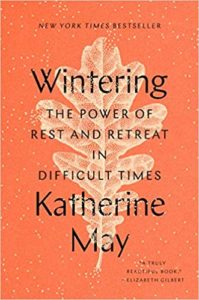The Noise of Starlings
Winter always comes. Perhaps not on schedule — too early in Wisconsin, too late in Louisiana. But it does come. And when it does, we don’t know what to do. We are unprepared.
But why aren’t we ready? Why have we not learned to adapt, pretending our lives are perennially sunny, 72 degrees? Why don’t we store up provisions for winter, like bears? Why do we push ourselves beyond what any self-respecting maple tree would do? Why have we not paid attention to the starlings?
Early in the book, Katherine May notices a murmuration of starlings, at least a hundred. They make a lot of noise, as starlings do. Simply observing them takes all of May’s energy. She doesn’t know it yet, but she’s already in hot water.
She is working too hard, ignoring physical cues, nurturing bad coping habits. All of which leaves her unprepared when her personal winter comes and cannot be ignored. She realizes she has no idea how to make ready for it.
So she seeks advice from a Finnish friend, who explains that in her country, preparations for winter start in August, a practice known as talvitelat. This friend also describes the centrality of sauna to Scandinavians.
A sauna is basically hot water, turned to steam. It’s essential to surviving a true Northern winter. May thinks she’ll replicate the practice in her home country of England, at a gym sauna. It does not go well. She’s not ready. She needs more preparation to settle herself for a long winter’s night.
So she heads to Iceland, a place known for its hot geothermal water. After May takes a swim in the turquoise Blue Lagoon, she gets sick with tonsillitis. She ends up in her hotel bed, re-reading a beloved children’s book that takes place in the north. She’s searching for something she cannot see, something maybe only starlings know:
I’m certain that the cold has healing powers that I don’t yet come close to understanding. After all, you apply ice to a joint after an awkward fall. Why not do the same to a life?”
Like May, I like to walk in winter, to see the nests in the tangled bine stems of the trees. And when it’s a winter of my soul, when every internal voice is as loud as a flock of starlings and my very heart feels hot, I — like May — choose to walk: “I have learned to walk until the heat leaves,” she writes in the chapter titled “Hunger.”
My personal winter is requiring more of me than I ever imagined. I must change how to eat, how to sleep, how to listen. I start my wintering small, by preparing hot water for herbal tea to sip in this time of extended darkness. The starlings murmur elsewhere.
Starlings
Your murmuration swells across the beach
Black plumage dulled to winter brown on each
Noisy chatter mimics my unquiet mind—
Metamorphosis: To myself, be kind.
Read and Write with Us
Each week I am writing a poem drawn from Wintering and from Edward Thomas’ Thaw. Won’t you write your own winter quatrain too?
We’re reading Wintering on a schedule that follows the calendar, from fall to winter to spring.
February 9: Hot Water & Starling (Prologue-September-October-November)
February 16: Cold Water & Gulls (December-January-February)
February 23: Thaw & Lapwing (March-Late March)
Photo by Jonathan Combe, Creative Commons, via Flickr. Post by Megan Willome.
Browse previous Wintering book club posts
I loved this book. As soon as I finished, I began reading it again.”
—David Lee Garrison, author of Playing Bach in the D. C. Metro
- Perspective: The Two, The Only: Calvin and Hobbes - December 16, 2022
- Children’s Book Club: A Very Haunted Christmas - December 9, 2022
- By Heart: ‘The night is darkening round me’ by Emily Brontë - December 2, 2022



Bethany R. says
Thanks for leading the book club and for writing this post. I’m glad you’re being kind to yourself as you winter, Megan. Pouring you a warm cup of herbal tea~
I wrote down a few lines from the book that stuck with me.
“We put on a brave public face and grieve privately; we pretend not to see other people’s pain. We treat each wintering as an embarrassing anomaly that should be hidden or ignored. This means we’ve made a secret of an entirely ordinary process . . .”
I appreciate how she normalizes these times of wintering.
Megan Willome says
Bethany, thank you for participating and for bringing up that particular quote.
I think one of the real gifts of the book is May’s showing us how to make this ordinary process less secret. Maybe some things need to be kept more private than others, but that’s different than putting on a brave face for the entire world.
Once we’ve let ourselves truly experience a wintering, we’re better able to recognize the signs in others, and to find ways to reach out with compassion.
Bethany R. says
Absolutely. No one should share beyond their boundaries. I don’t get into all level of detail about things I’ve gone through, but I will say, I’ve seen a few winters, and my heart goes out to others in the freeze.
Which brings us back to the beautiful point you made about it increasing our capacity for empathy and care toward others. At least that blossoming is one good gift to come out of such icy times.
Thanks again for sharing your words here, Megan.
Adding one more quilt layer on top of your blankets today~
Megan Willome says
I love the winter words you’ve woven into this comment!
HCB says
I’m the section called “Slumber” in “November”, it’s interesting to think about a pattern of sleep where waking up in the middle of the night after four hours of sleep and then spending 2-3 hours being “contemplative and restful” before sleeping another four hours. When I’ve had difficult periods that could be characterized as wintering, and the idea of sleeping through the night seems foreign to me, I never considered embracing the disrupted pattern and pursuing a different paradigm for nightly rest.
—-
Goodnight
I told you goodnight
How I wish the next thing I saw
Was your face in the morning
But I know it won’t be
Was that ever the case?
Will it ever be again?
Megan Willome says
HCB, glad you’re joining us!
I’ve heard that idea about disrupted slumber before, and based on reading the book, I have tried to be a *little* more open to those middle of the night times and leave room for contemplation. Or at least, leave room from anxiousness.
Thank you for sharing your poignant poem. A lot of pain there. Wishing you your title, a Goodnight.
Bethany R. says
Thank you for sharing your experience and your poem with us, HCB.
Debra Hale-Shelton says
I listened to May’s audiobook as an ice storm hit Arkansas and I had to start living with my 91-year-old mother. At the time I thought I would be back home in a couple days. A week later, it appears that I may have to stay here indefinitely. When I think it can’t get worse, I learn that our 16-year-old cat may be in her final days. I’m thinking I need to reread the book, this time reading, not listening, and letting it help me cope better.
I loved the first sentence: “Some winters happen in the sun.”
That’s exactly what happened with my mother and me today. It was sunny outside but nothing was going right inside.
I am so grateful that you are leading a discussion of this book. It couldn’t come at a more perfect time for me. I think I’ll start by brewing myself a cup of herbal tea. Thank you, thank you.
Bethany R. says
I’m glad you’re joining us here, Debra, but so sorry you are going through all this upheaval and heartache. And thank you for sharing that first sentence with us again, it is lovely.
Megan Willome says
Yes! That first sentence!
One of my winters began on a sunny March day, when I got a phone call about my dad. It changed my life, just as it sounds yours is being changed right now.
So grateful you are with us, Debra. I can vouch for the fact that the book holds up extremely well to a reread.
Debra Hale-Shelton says
https://mailchi.mp/themarginalian/wintering
The Marginalian, formerly Brain Pickings, has an interesting article relating to May’s book it’s at the link above.
HCB says
Interesting lines from the article:
“There are self-punishing ways to be sad, and self-salving ways to be sad.” Productive sadness is the concept I think I’m trying to learn through this book and book club.
“…its ethos of linear progression toward states of ever-increasing flourishing.” I’ve definitely picked up on the book’s concept of willingly allowing 1 or 2 steps back to ultimately take 3 or 4 steps forward. Not something we normally allow for.
Thanks!
Megan Willome says
Ooh, thanks for the article link, Debra. It contains many quotes I love from the book. I could have written three whole entries on her discussion of abscission.
HCB, a virtual book club is just like a regular book club, minus the Chardonnay. 🙂
HCB says
This is my first virtual book club. I am enjoying the interaction and comments. Thanks for sharing, Bethany and Debra (and Megan). And thanks for the article, Debra. I’m looking forward to reading it.
laura says
I read this book right after Thanksgiving last year and I’ve been thumbing back through this afternoon, trying to remember what it was that was so compelling for me. Many things. I do remember this: May’s words felt like a steady companion in the dark. One thing that struck me as I combed back through and re-read the story of her husband’s illness is, why do we have to be jolted into attending to what really matters? I suppose this is a good part of her thesis, but I suspect I will be learning this lesson time and time again over the years. Slow learner that I am.
I love your starlings poem. I am forever chasing starlings out of my feeder area, often running–arms waving–full on at them in hopes this live scarecrow will make them think twice about coming back. But I do love to stand underneath a murmuring and feel the breeze of thousands of wings take flight.
Megan Willome says
Hi, Laura! I love the image of you as a live scarecrow. And of you, at a different time, lettting yourself be carried away by starlings.
I wonder if this is what May is nudging us to notice, the seasonality of it all? Like you, I can be a slow learner of what I already know.
So glad you’re rereading with us!